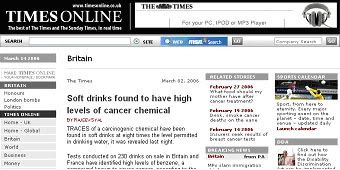Benzene in our soft drinks?
Technorati tags: Health, Junk Food, Benzene
Hot off the heels of a possible widespread eyecare problem, this report has just surfaced. Although the report is from the UK, the same could apply here in Malaysia.

Soft drinks found to have high levels of cancer chemical
By Rajeev SyalTRACES of a carcinogenic chemical have been found in soft drinks at eight times the level permitted in drinking water, it was revealed last night.
Tests conducted on 230 drinks on sale in Britain and France have identified high levels of benzene, a compound known to cause cancer, according to the Food Standards Agency. There is a legal limit of one part per billion of benzene in British drinking water. The latest tests revealed levels of up to eight parts per billion in some soft drinks.
Benzene has been linked to leukaemia and other cancers of the blood. Traces found in Perrier water 15 years ago led to the withdrawal of more than 160 million bottles worldwide. The disclosure has prompted food safety campaigners to demand that the Government reveal which products contain benzene. At present, the drinks’ identities have not been revealed.
Could this be one of the reasons why the reported cases of cancer has been on the increase over the last decade? I don't have the figures to back this up, but hasn't the consumption of junk food, including aereated sugar-laced drinks, increased as well? It definitely has to do with our diet, no doubt about that. Foods deep-fried in re-used cooking oil (or over-used batches of it) have also been suspected as a possible contributing factor (which is why I refrain from eating yau-char-kwai these days, as much as I love it).
Soft drinks have always been a Malaysian favorite, since way back when, since as long as I can remember. According to the news report, the Benzene is a by-product of a reaction between Sodium Benzoate (a preservative) and Ascorbic Acid (Vitamin C). The report also states that soft drink manufacturers have been adding Vitamin C in their products in recent years to give their products a "healthier" image.
Let's hope the Malaysian Health Ministry takes this scare seriously; at the very least, conduct random sample tests to determine whether or not this is a real problem.

















